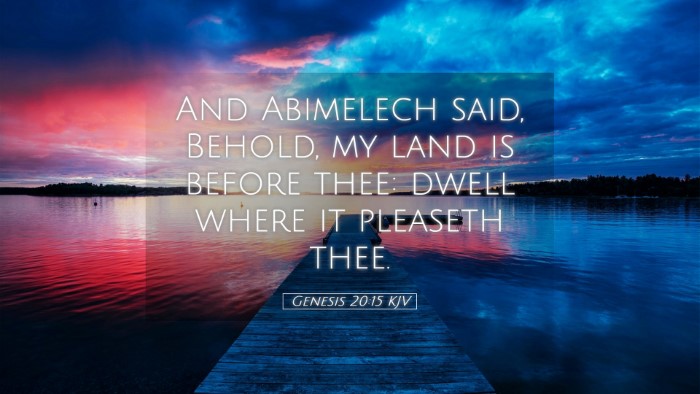Commentary on Genesis 20:15
Verse: "And Abimelech said, Behold, my land is before thee: dwell where it pleaseth thee." (Genesis 20:15)
Introduction
This passage reveals an intriguing interaction between Abraham and Abimelech, the king of Gerar. It highlights both the providence of God and the moral integrity despite the surrounding challenges and fears. The historical context, along with the theological implications found within these verses, provides rich material for exploration.
Contextual Background
Genesis 20 occurs shortly after the pivotal events of Genesis 19, which narrates the destruction of Sodom and Gomorrah. Abraham, in his journey, encounters Abimelech. This story follows a somewhat similar account with Pharaoh in Egypt (Genesis 12:10-20), where Abraham's fear leads him to pass Sarah off as his sister. Here, Abraham unknowingly jeopardizes his wife’s honor, concealing the truth due to fear of harm.
Abimelech's Response
In Genesis 20:15, Abimelech generously offers Abraham the freedom to reside wherever he desires in the land. This response can be analyzed through various lenses:
- Hospitality: Abimelech embodies the ancient Near Eastern custom of hospitality. His offer extends compassion and protection towards Abraham and Sarah, reflecting the importance of treating foreign visitors favorably.
- Political Strategy: By welcoming Abraham, Abimelech seeks to forge a relationship with a man blessed by God. The king intuitively recognizes Abraham’s divine favor and the potential benefits that could arise from an alliance.
Theological Insights
"Behold, my land is before thee..."—This phrase illustrates more than mere political gesture; it is a demonstration of divine provision. Scholars note that God’s protection over Abraham prevails even among pagans. This conveys a significant theological theme that amidst human failings, God still executes His will through the actions of others.
Divine Providence
Abimelech's welcome is a vivid illustration of God's provision. In the face of Abraham's deceit and fear, God intervenes, ensuring that His covenant people are safeguarded. Matthew Henry emphasizes that "in all places, God can find ways to provide for His people." This reinforces the understanding that our security lies not in our cunning but in God's sovereign plan.
Human Fallibility
Moreover, the narrative showcases human fallibility. Abraham, while a man of faith, demonstrates moments of doubt. Albert Barnes observes that Abraham’s actions stemmed from fear, potentially highlighting the tension between faith and human instinct. This reality offers valuable lessons for pastors and theologians alike, reminding us that even the faithful may falter.
Character Study: Abimelech
Abimelech serves as a curious character in this narrative. Despite his position as a king and a pagan, he shows moral integrity, acting justly towards Sarah. Adam Clarke notes this as a reflection on the moral state of one's character, suggesting that holiness is not confined to Israel alone, and God can work through anyone, regardless of their background.
This presents an invaluable teaching point about discernment and integrity:
- Righteous Leadership: Abimelech's actions emphasize the responsibilities placed upon leaders, regardless of their faith. He navigates the truth and justice in ways that even those within God's covenant fail.
- God's Judgment: The initial divine intervention through the dream serves as a reminder that God’s judgment is not restricted to His chosen people alone. All nations are held accountable to His moral law.
Applications for Today
As pastors and believers reflect on this narrative, several contemporary applications emerge:
- Trust in Divine Provision: Believers are encouraged to place their trust in God’s provision, particularly during challenging circumstances where fear may tempt us towards deceitful actions.
- Integrity in Leadership: The example of Abimelech prompts leaders to exhibit integrity, ensuring their actions reflect moral principles, even when under pressure.
- Interpersonal Relationships: The narrative invites us to extend kindness and hospitality towards strangers and others, recognizing that we may often be called to minister to those who do not share our faith.
Conclusion
Genesis 20:15 stands as a profound witness to the complexities of faith, fear, and divine providence. This interaction between Abimelech and Abraham highlights critical themes relevant to all believers, revealing God’s desire for all humanity to engage with His truth. As we study this verse, may we be reminded of God’s unfailing presence in our lives, calling us to integrity and faithfulness in all circumstances.


